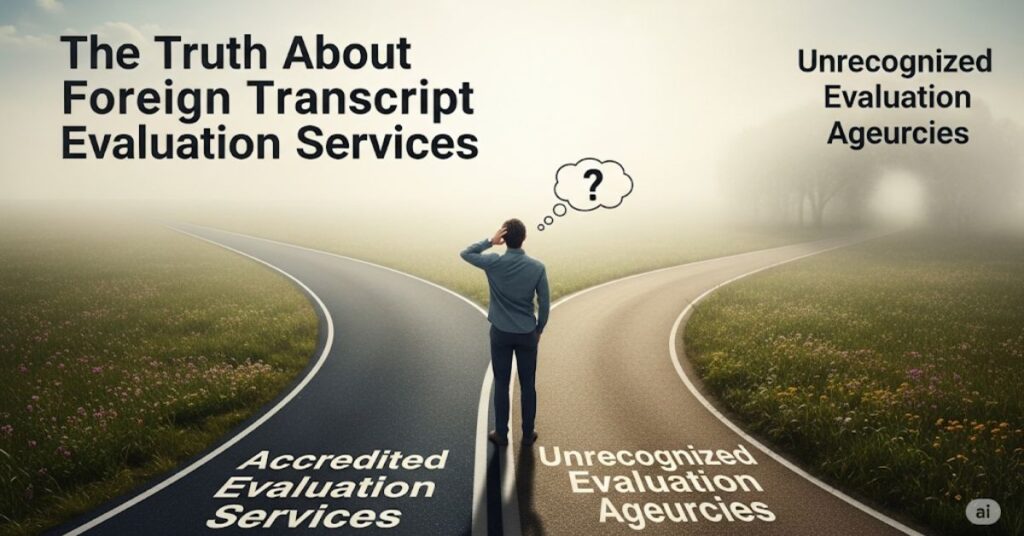The degree is real. The hard work was real. The all-nighters, the coffee-fueled study sessions, the final exams you thought would never end, they were all real. But once you step into a new country, holding that foreign diploma in your hands, a new question suddenly becomes very real too: Does it count here?
That question sits at the heart of an often-overlooked but deeply important process of foreign transcript evaluation services. This isn’t just a box to check off on your path to further education or career growth. It’s your academic story being retold in a language your new country understands.
And as simple as that might sound, it’s anything but.
Why Evaluation Exists in the First Place
Let’s say you earned a law degree in Brazil, or a bachelor’s in engineering in India, or maybe you completed your high school diploma in Nigeria. These credentials are perfectly valid in your home country. But in the U.S., Canada, the U.K., or any other foreign system, they’re unfamiliar.
That doesn’t make them any less valuable. But it does mean they need interpretation. Think of foreign transcript evaluation services as translators not of language, but of academic meaning. They don’t just read the words on your diploma. They study the educational system it came from, how grades are calculated, how long the program was, and what the curriculum covered. They translate academic worth.
This evaluation helps universities, licensing boards, and even employers understand what your education truly represents in their context. Without it, your achievements risk being misunderstood or, worse, dismissed.
A Lot at Stake: More Than Just Paperwork
This isn’t about red tape. It’s about opportunity.
For international students, an evaluation can determine the difference between getting accepted to a graduate program and not. For professionals in regulated fields like law, medicine, or education, it can mean qualifying for licensure or watching a career stall.
There’s also emotion here. It’s about dignity. I want the years you spent in classrooms abroad to be acknowledged and respected. It’s about starting fresh without starting over.
But here’s the catch: not all transcript evaluations are equal. And not all services understand the weight they carry.
What Makes a Good Transcript Evaluation Service?
At its best, transcript evaluation is meticulous, fair, and context-aware. It should involve:
- In-depth research into the educational system of the originating country
- Course-by-course comparisons to the new country’s academic structure
- Accurate GPA conversions, not just direct number swaps
- Recognition of accreditation bodies, regional differences, and curriculum depth
It’s technical. It’s complex. And most importantly, it’s high-stakes.
That’s why more people are turning to reputable providers like The Spanish Group, which has built their name not just on translation, but on trusted, detail-oriented academic evaluations that don’t leave room for error.
Where Translation Meets Evaluation
Foreign transcript evaluation isn’t just about numbers and grades. Many of the original documents, transcripts, diplomas, and course descriptions are in another language. Before evaluation even begins, these need to be accurately and professionally translated.
That’s why companies like The Spanish Group offer a streamlined solution: certified translation and evaluation services under one roof. They don’t treat these as separate tasks, but as interconnected steps of the same journey.
This matters more than you might think. If the translation isn’t USCIS-compliant or university-acceptable, the evaluation gets rejected. If the formatting is off, the meaning gets lost. And if any of it feels uncertain or inconsistent, your entire application could be delayed or denied.
With a service like The Spanish Group, the evaluation process becomes less about navigating bureaucratic landmines and more about gaining clarity and confidence.
Who Needs It?
You might be surprised to learn just how many people rely on foreign transcript evaluation services every year:
- International students applying to colleges or graduate programs
- Immigrants seeking professional licensing in nursing, teaching, or engineering
- Employers hiring foreign-educated professionals and needing credential verification
- Credentialing agencies evaluate qualifications for boards and certifications
- Government offices validating education for immigration or visa purposes
The common thread? Every one of these situations involves trust that your academic history is being interpreted accurately, respectfully, and in a way that reflects its true value.
Why It’s Personal
Beneath all the technicalities, this is deeply human work.
Behind every transcript is a story. Of someone who studied through challenges. Of someone who moved halfway across the world to build a better life. Of someone trying to make sense of an entirely new system while holding on to their roots.
Foreign transcript evaluation services are not just about aligning academic scales; they’re about bridging human ambition across borders.
When a service does this well, it opens doors. It grants access. It tells you, in a new country, that your past still matters and that it still has the power to shape your future.
The Spanish Group: More Than Just a Service
It’s easy to feel like just another number in the system. Just another application. Just another transcript.
But the team behind The Spanish Group knows better. They treat each document as if it carries weight because it does. Their evaluators and translators don’t just check boxes; they ask the right questions, follow international education guidelines, and produce documentation that stands up to institutional scrutiny.
Whether you studied in Seoul or São Paulo, the Spanish Group helps ensure your academic voice is heard loud, clear, and credibly.
In a world where borders may divide but ambition unites, foreign transcript evaluation services do something quietly revolutionary: they help dreams survive translation. And when done right—whether it’s evaluating transcripts in Chinese, Japanese, or any other language—they don’t just prove what you’ve learned, they honor who you are.


